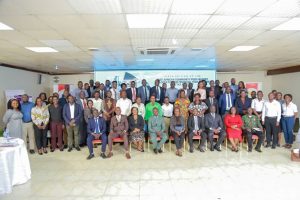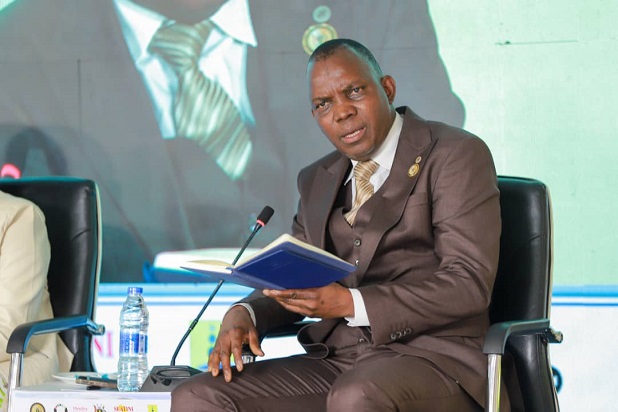Moses Kaggwa, Director Economic Affairs at the Ministry of Finance, condemned the persistent application of non-trade barriers in the region
The East African Community (EAC) has grappled with the issue of non-tariff barriers (NTB) or barriers to trade for as long as it has existed, despite the existence of what experts see as adequate legal frameworks.
All the countries, at least going by the proclamations of the heads of state, say they believe in the integration of the region, whose main objective was/is to improve trade and investment within a borderless region.
However, the EAC, which is marking 25 years since its revival in July 2000, has seen intra-regional total trade remain at a low 15 percent of the regional total trade, recording 12.1 Billion Dollars in 2023.
With the NTBs ensuring that trade remains low, it means that output, especially industrial and agricultural, will remain suffocated.
Arguably, Uganda has suffered the biggest brunt of the effects of this, with countries like Kenya, Tanzania, and South Sudan imposing blockades on Ugandan products at some time, while Uganda’s trade with Rwanda suffered a blow when the southern neighbour closed the border for two years.
The latest development is Tanzania’s introduction of the Tanzania Industrial Development Levy (IDL), introduced through the Imports Control Act, to specifically target selected imports, including those from the rest of the EAC.
Moses Kaggwa, the Director for Economic Affairs at the Ministry of Finance, Planning and Economic Development, says this will definitely affect trade, and it violates the EAC Treaty and the EAC Customs Union Protocol.
He was speaking at the EAC Post-Budget Dialogue organised by SEATINI Uganda in conjunction with the Ministry of Finance and the Ministry of EAC Affairs.
Rebecca Kadaga, the Second Deputy Prime Minister and Minister for EAC Affairs, says that the EAC integration agenda is being hindered by different NTBs, including the negotiation of trade agreements between individual countries and other regions.
However, citing the example of Kenya, Kadaga says there is nothing much that can be done since the country is now in a different development category, which bars it from many preferential trade deals with regions as per the World Trade Organisation.
But she condemned as annoying the continued use of standards and protectionist measures by EAC countries to block goods from other partner states, specifically saying ministers usually go against the decisions of heads of state regarding NTBs.
Her view was also echoed by Anna Nambooze, Country Director of TradeMark Africa for Uganda and South Sudan.
“The increased charges on goods imported for home use aimed at encouraging local consumption will ultimately raise costs for both businesses and consumers, which could reduce affordability and competitiveness,” she said.

EAC Deputy Secretary General, Annette Mutaawe Ssemuwemba, says what Tanzania and other countries are doing is an outright violation of the EAC laws, regulations and treaties.
The EAC loses at least 10 Billion Dollars annually through NTBs, with, unfortunately, the biggest sector by employment, which is agriculture, being the most affected, as agro-products are the ones being blocked at borders mainly.
According to her, if all NTBs were removed, intra-EAC trade would grow by more than half. At least 247 trade barriers have been removed over time, but Mutaawe says new ones keep coming up either in their original forms or in different structures.
She hopes that a review of the rules of origin framework, activation of the Dispute Settlement Mechanisms and respect for laws can go a long way in resolving this outstanding challenge.
The fear is that if trade continued to be stifled, the region will continue losing needed revenues, which would otherwise compensate for the dwindling external financing sources, hence increasing the need to borrow and push debt levels even higher.
Herbert Kafeero, the Communications Manager, on behalf of Jane Nalunga, the Executive Director at SEATINI Uganda, said that at a time when countries are becoming more concerned about their domestic affairs, the EAC region has to focus on domestic revenue mobilisation.
He advised that to realise opportunities like the African Continental Free Trade Agreement (AfCFTA) and Tripartite Free Trade Area benefits, EAC Partner States must align tax regimes, customs procedures, industrial policies, and adopt a coherent regional fiscal framework to enhance competitiveness and fiscal sustainability.
Effective implementation of Article 49 of the EAC Customs Union Protocol is essential to eliminating NTBs and enabling harmonised trade procedures across Partner States, he said.
Moses Kaggwa said that one of the magic bullets to financing problems should be the integration of infrastructure projects, so that, apart from improving infrastructure to boost development in the region, they can easily get financing.
-URN





